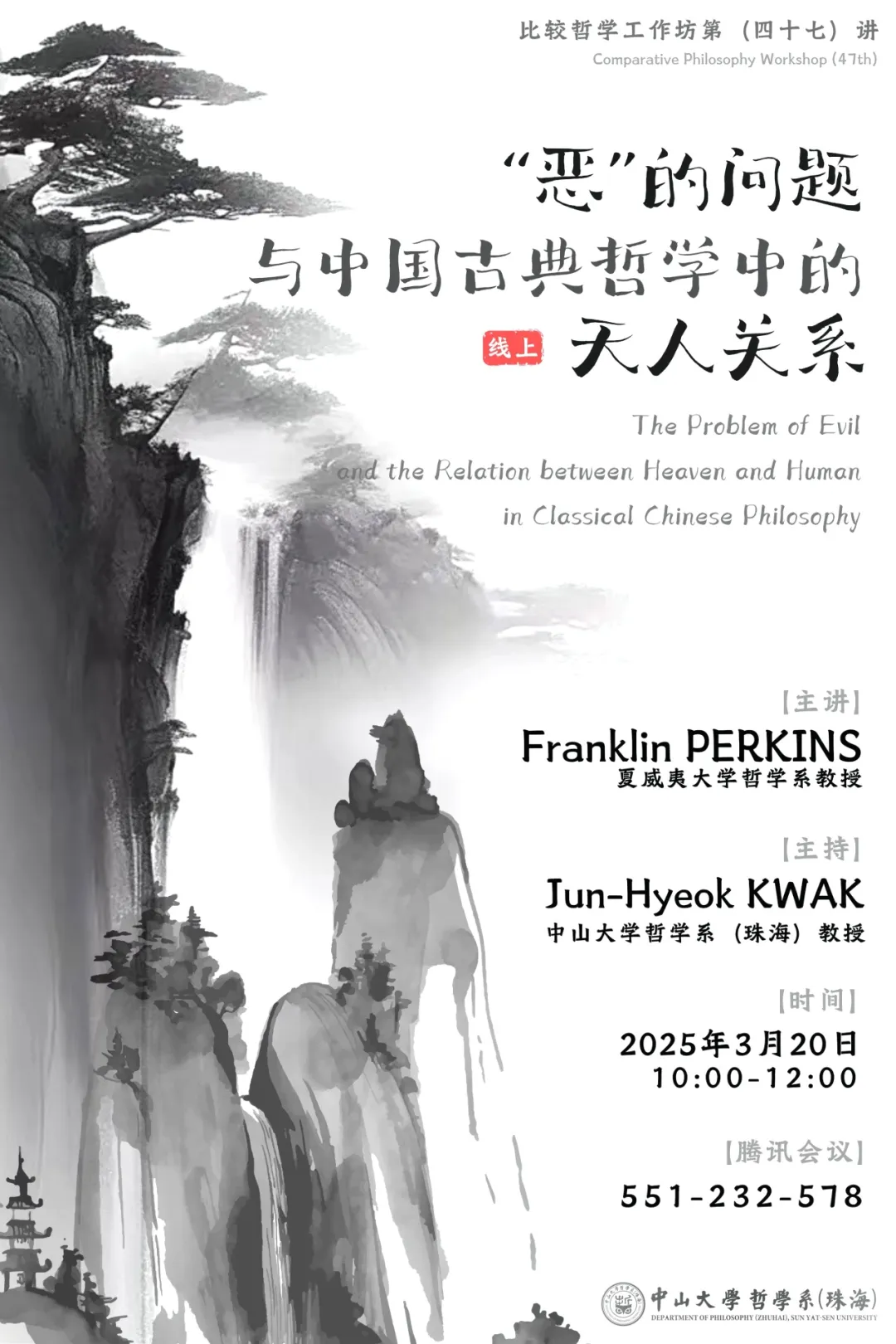学术资讯|比较哲学工作坊第四十七讲:“恶”的问题与中国古典哲学中的天人关系
“恶”的问题与中国古典哲学中的天人关系

Comparative Philosophy Workshop (47th)
01.
Organizer
Department of Philosophy (Zhuhai), Sun Yat-sen University
02.
Topic
The Problem of Evil and the Relation between Heaven and Human in Classical Chinese Philosophy (Virtual)
03.
Speaker
Franklin PERKINS,Professor, Department of Philosophy, The University of Hawai’i
04.
Moderator
Jun-Hyeok KWAK,
Professor, Department of Philosophy (Zhuhai), Sun Yat-sen University
05.
Time
Mar.20.2025,10:00-12:00
06.
VOOV
551-232-578
ABSTRACT
In European thought, the classical problem of evil is about God – how could an omnipotent and perfectly good God make a world that has evil in it? While this problem is not significant in early China, a similar problem emerges in the tension between two mottoes: “the unity of heaven and human” (tianrenheyi 天人合一), and, “the division between heaven and human” (tianrenzhifen 天人之分). This tension arose from the breakdown in the Spring and Autumn and Warring States periods of the early Zhou doctrine of the “Mandate of Heaven” (tianming 天命). As belief in a good and providential heaven declined, philosophers faced a dilemma between aligning with a heaven that seemed indifferent to human welfare or giving up the goal of aligning with heaven, seeking a different basis for norms. I will begin with an overview of the problem and then briefly discuss three prominent responses to it: Mengzi, Zhuangzi, and Xunzi.
01.
主办
中山大学哲学系(珠海)
02.
主题
“恶”的问题与中国古典哲学中的天人关系(线上)
03.
主讲
Franklin Perkins
夏威夷大学哲学系教授
04.
主持
Jun-Hyeok KWAK(郭峻赫)
中山大学哲学系(珠海)教授
05.
时间
2025年3月20日 10:00-12:00
06.
地点
腾讯会议 551-232-578
摘要
在欧洲思想传统中,经典的“恶”的问题关涉上帝——全能且至善的上帝为何会创造一个存在恶的世界。尽管这一问题在中国历史早期并不显著,但类似的问题却可在“天人合一”和“天人之分”这两句箴言的张力之中得见。这一张力源于周朝早期的“天命”学说在春秋战国时期的崩溃。随着对善的、关心人类福祉的“天”的信仰逐渐衰退,哲学家们面临着一个两难抉择:要么尊崇一个似乎对人类福祉漠不关心的“天”,要么放弃对天的尊崇,转而寻求其他的规范性基础。我将首先概述这个问题,然后简要探讨孟子、庄子和荀子对此的三种主要回应。
来源|哲珠新媒体
海报|杨 琳
文稿|杜 陈
编辑|杨 琳
初审|韩 珩
审核|卢 毅
审核发布|屈琼斐


